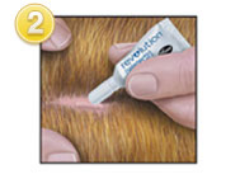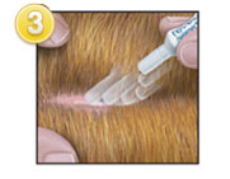- Want to Buy Revolution?USE OUR VET FINDER TOOL
-
REVOLUTION FOR DOGS
 SEE REVOLUTION
SEE REVOLUTION
FLEA FOR CATS
ABOUT REVOLUTION
Providing Parasite Protection
Dogs and parasites share a long, usually irritating and sometimes dangerous history together. But happily, it can be easy to stop history from repeating itself with your own four-legged best friend.
Just a quick spot application of Revolution for Dogs every month is all it takes to keep your dog free from fleas as well as sarcoptic mange and ear mites.
REVOLUTION FLEA FOR DOGS
- Works inside and out to protect against internal and external parasites
- Is waterfast after two hours and won’t wash off
- Is quick and easy to administer
- Stays effective for an entire month
- Kills fleas in a dog’s living environments as well
- Is available in a range of dose sizes to suit any dog
For more information about flea treatments and Revolution for Dogs, ask your vet, or since you’re already here, simply take a look around this web site.


Only 5% of fleas live on a dog – the rest live in and around a dog’s living spaces. That’s why Revolution for Dogs has been designed to kill the fleas, flea eggs and flea larvae in those places as well.
FLEAS & OTHER PARASITES
FLEAS & OTHER PARASITES
Providing Parasite Protection
Parasites are the cause of many diseases in puppies and dogs. To keep your dog healthy, learn how to recognise the symptoms of parasites, as well as how to prevent and treat parasite infestations.
CLICK ON A PARASITE BELOW TO LEARN MORE
FLEAS
There’s no other way to put it - fleas are blood-sucking ectoparasites (live on the skin surface of their ‘host’).
What is a flea?
Fleas are blood-sucking ectoparasites. There are 2,200 flea species known in the world today. Only a few of these commonly infest dogs and cats. Fleas are not the same as ticks.
The most common flea that affects both dogs and cats is the cat flea, or Ctenocephalides felis. It’s dark brown or black body is about one to three millimetres long. They can also feed on people, but we’re not their first choice of meal.
Why do dogs get fleas?
Fleas love warm, humid environments. And they are determined, nimble creatures capable of Olympian feats. When they’re hungry and looking for a home, they can jump 10,000 times in a row up to 60 centimetres high. Plus their flat bodies allow them to move quickly through a dog’s fur.
You’ll usually find fleas on a dog’s abdomen, the base of the tail and the head. However, a heavy infestation can thrive anywhere on the body.
What are common signs that my dog has fleas?
- You may be able to see fleas on your dog, especially if there is a large burden
- Fleas are small, and just because you don’t find one on your dog, it doesn’t mean that they’re not there or that your dog is not being bitten by them!
- Fleas suck your dog’s blood and can cause terrible skin irritation that will make your dog scratch, lick and bite themself. This may result in rashes, scaly skin, hot spots and hair loss
- Droppings, digested blood known as flea dirt, in your dog’s coat
THE 4 LIFE CYCLE STAGES OF A FLEA
What do fleas do to dogs?
Adult fleas have specially adapted mouth parts for piercing the skin and sucking blood. More than just annoying and irritating to your dog, they can also cause significant skin disease. Flea blood feeding is also associated with the transmission of several infectious diseases to both pets and people in New Zealand.
What is flea allergy dermatitis (FAD)?
It’s an itchy skin disease animals develop from an allergic reaction to the saliva of fleas feeding on their blood. An affected dog will be very itchy – often from scratching, biting, licking and chewing. Their skin is usually reddened and there may be lesions and hair loss.
Infectious diseases from fleas
It’s not just your dog at risk here. Fleas can carry infectious diseases that are transmitted to humans such as:
- Rickettsia spp. - causes flea-borne spotted fever
- Bartonella henselae – causes cat scratch fever
- Yersinia pestis – causes Plague, an identified agent of bioterrorism.
How can I treat or prevent fleas?
Products such as Revolution® can be used to treat, control and prevent flea infestations, as well as control flea allergy dermatitis.
Flea preventatives should be used year round. Your vet will be able to help you choose the right one for your dog.
WHAT IS A PARASITE?
A parasite is a plant or animal that lives on or inside another living organism (called a host). A parasite is dependent on its host and obtains a benefit, such as survival, at the host’s expense.
ARE THERE DIFFERENT KINDS OF PARASITES?
There are two basic types:
Internal parasites (endoparasites) such as roundworms live inside the body of a host dog.
External parasites (ectoparasites) such as fleas, ticks, ear mites and sarcoptic mange mites live on the body of their host dog.
HOW DANGEROUS ARE PARASITES TO MY DOG?
It depends on three things: the type of parasite, the degree of infection or infestation, and your pet’s individual reaction. A mild flea infestation may be of no great consequence to some dogs, while others may show hair loss, itching and discomfort. Severe flea infestations can lead to significant skin disease, anaemia or even death, especially in young puppies. Infestations by ear mites can cause inflammation of the outer ear (i.e. ‘otitis’) that can be further complicated by secondary fungal and bacterial infections characterised by an unpleasant odour and a crusty brown discharge. Sarcoptic Mange Mites can cause severe itchiness, hair loss and discomfort. These mites can also infect humans who come into contact with affected dogs.

Only 5% of fleas live on a dog – the rest live in and around a dog’s living spaces. That’s why Revolution for Dogs has been designed to kill the fleas, flea eggs and flea larvae in those places as well.
It’s not just your dog at risk here, fleas can carry infectious diseases that are transmitted to humans too!
TREATMENT &
PREVENTION PLAN
Only 1 out of every 20 fleas affecting your dog are found on his or her body. So where are all the others? They’re in and around your dog’s living environments.
While Revolution is extremely effective in treating the fleas running, jumping and bouncing around on your dog, eradicating them and preventing them from coming back will be most effective when your dog’s living areas are being treated at the same time.
-
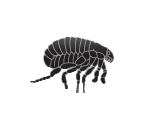 TREATMENT PLAN
TREATMENT PLAN
If there are already fleas in your dog’s living spaces, this Flea Treatment Plan will help you get your house parasite-free as quickly as possible. -
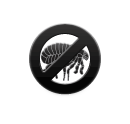 PREVENTION PLAN
PREVENTION PLAN
Now you’ve created a flea-free environment, use this Flea Prevention Plan to make sure they don’t come back.
TREATMENT PLAN
Treatment plan to create a flea-free home
To eradicate any fleas that have followed your dog back to your place and made a home for themselves there, do all of the following as thoroughly as possible:
- 1.Treat all your dogs and cats with Revolution
- 2.Vacuum lounge chairs and cushions (and bin or burn the vacuum bag immediately afterwards)
- 3.Throw out any cushions you think could have infestations
- 5.Clean out the kennel or basket
- 6.Vacuum the car
- 7.Vacuum or wash rugs, and administer flea control treatment
- 8.Wash any household bedding in hot water at least 60° C
PDF 2.10MB

TIPS FOR A HEALTHY DOG
Keeping your dog healthy is a lifelong commitment. At each stage of your dog’s life, his or her needs will change. Here are some tips.

PUPPIES
LESS THAN 12 MONTHS
Puppies are as vulnerable as they are adorable. Their immature immune systems can’t fight off disease, and the protection received naturally through their mother’s milk can interfere with early vaccinations. That’s why these youngsters need vaccinations several times during the first months of their lives.
Puppies also need examination and treatments for parasites, and they need to be started on a program. Unless you have breeding plans, it is also recommended that your pet be spayed or neutered. A nutritional needs analysis and behavior counseling round out the care at this important lifestage.
ADULT DOGS
FROM 1 TO 7 YEARS OLD
Adult dogs should have regular (i.e. annual) examinations and vaccinations with their vet. Take advantage of these exams to fill the vet in on the kind of lifestyle your dog is leading. Because the more your vet knows about your dog, the easier it is for the vet to advise you on your canine buddy’s health needs. And don’t forget to ask your vet about flea treatments, and the other parasites Revolution for Dogs is formulated to prevent.
They may not be puppies any more, but adult dogs still need lots of regular exercise. Try to find time to go for a decent walk together once a day. It’ll be good for you dog, and good for you too.
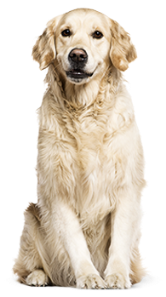
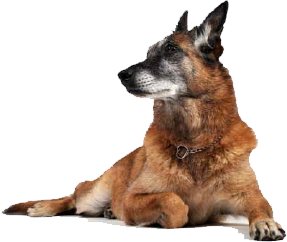
SENIOR DOGS
OVER 7 YEARS OLD
Once your furry best friend becomes a senior dogizen (around 7 or 8 years old), he or she needs to visit the vet clinic more frequently than before. Ask your vet about senior pet examinations and expanded screenings, disease prevention programs, nutrition analysis and behaviour counselling geared specifically for your dog’s rich golden years.
In the meantime, be on the lookout for any changes in behaviour as your dog gets older. While some changes are inevitable and natural, others may be a problem, but treatable.









